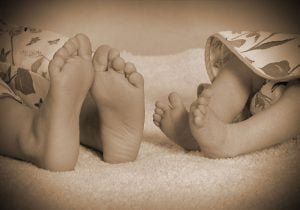
There are no ifs, ands, or buts about it — kids have cute feet. Those piggies are precious. So, when you notice they look flat, you worry. Because you don’t want anything affecting those yummy digits, yes, but also because you’re a mama and, well, that’s just what you do. But are flat feet in kids a cause for concern? We took a closer look.
Why do my toddler’s feet look flat?
It goes without saying that you think every part of your little pumpkin is practically perfect. However, your parenting instincts usually ping when you can tell something isn’t quite right. In this case, you’ve started to wonder why your baby’s feet look flat, and that’s a valid concern.
The medical term for flat feet is pes planus, although you may also hear it referred to as ‘overpronation’ or flexible flat foot. And, if we’re really being honest, they’re not hard to spot. Take it from a mom whose son’s feet were affectionately dubbed “Flintstone feet” when he was a baby. Flat feet are precisely what they sound like — feet that seemingly lack an arch and thus most or all of their foot touches the floor.
How common is this?
You’re probably curious to know if flat feet in kids is quote-unquote normal. In which case, it should relieve you a little to hear that it is, in fact, normal in babies and toddlers. Up to 44 percent of three- to six-year-olds exhibit flat feet. Most children will grow out of this condition by the age of six, though.
What causes flat feet in kids?
Myriad reasons for flat feet in kids exist. But let’s look at the two core reasons so many babies appear to have flat feet when born. You see, kids’ bones and joints are flexible. This causes their feet to flatten when they stand (hence this condition being called flexible flat foot). Plus, babies are born with a fat pad in the arch area, so the arch doesn’t usually develop until the age of 2 or 3.
Still, there are other causes of this condition in kids. You might even need to look in the mirror — some kiddos inherit it. For children who can’t look to genetics for their flat feet, there may be a physiological reason. For example, some children may start with tightness of the heel cord, or Achilles tendon. This limits the motion of the foot and can result in flat foot. Alternately, if your child’s ligaments are too stretchy, their heel bone may rotate in, collapsing the arch.
How are flat feet diagnosed?
If you suspect your child may be flat-footed, you can do a little at-home diagnostic test. Have your little cutie stand barefoot, facing away from you. Stand directly behind them and take a picture. Can you see their pinky toe and big toe in the picture? Or do you see the pinky toe and ring toe but not big toe?
Of course, this is just for reference. You’ll need to consult with your Resonance Podiatrist for an actual diagnosis. As for what age flat feet can be diagnosed, your Podiatrist should be able to tell by the time your child is 4 or 5 if they are truly flat-footed (the arch usually doesn’t develop until age 2 or 3).
Will my child need special treatment?
Typically, flat feet correct on their own as your child develops muscle strength and their soft tissues stiffen. But if not, don’t fret! Flat foot is not generally considered a cause for major concern. If your little one isn’t experiencing pain or any other symptoms, our Podiatrists will likely just keep an eye on it and not require any further testing or treatment.
If your child is experiencing foot pain, pressure on the inside of the foot, stiffness and limited side-to-side motion, limited up-and-down motion, or sores developing on the inner side of the foot, their doctor may order imaging tests such as X-rays to better assess your child’s condition.
So, how can I help?
Resonance Podiatrists may recommend a range of non-surgical options to help alleviate problems stemming from flat feet, such as pain or improper walking pattern. These include treatments like orthoses, supportive shoes, foot-specific stretches, weight loss (if a child is overweight, it may add stress to the feet), or exercises.
To find out more, book an appointment with your Resonance Podiatrist today.
0800 473 776
